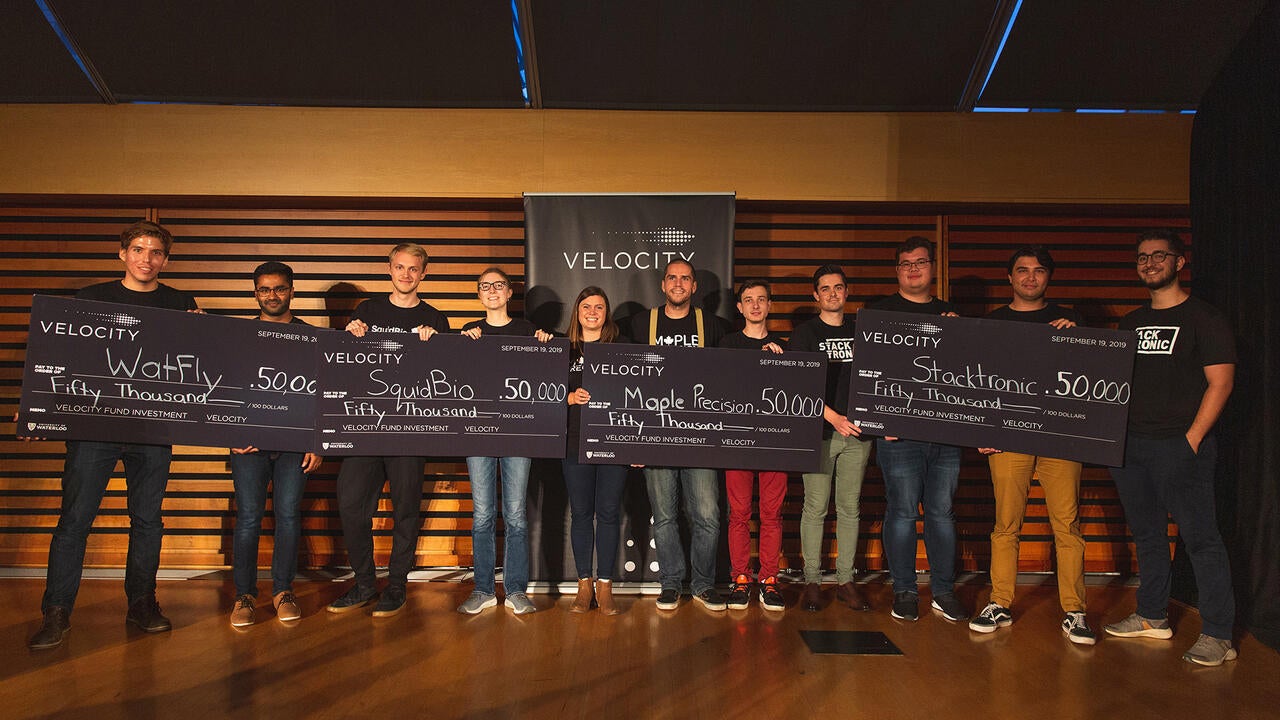
Velocity’s growing disruption
Why the incubator’s growth is good for Canada’s economy

Why the incubator’s growth is good for Canada’s economy
By Chris Wilson-Smith University RelationsVelocity decided it was time to reach for a new speed.
For the first time in the history of its marquee pitch competition – one that has helped shape dozens of winners whose combined value now exceeds $1 billion — leaders of the University of Waterloo’s flagship entrepreneurship program brought the event to Toronto.
On the surface, the differences could be easy to miss: the drive is just over an hour and a half, depending on traffic. The night would unfold as usual — the 10 finalists get just three minutes to make one of the most important pitches of their lives— and the stakes would be the same. The winners would compete for one of four $50,000 investments.
But for both the competitors and the investors at the Bram & Bluma Appel Salon in the Toronto Reference Library on a recent September night, the 113 kilometres separating Waterloo and Toronto represented a world of opportunity. It is why the incubator made the decision to shift an already winning formula.
“This is about the Waterloo-Toronto corridor,” Jay Shah, director of Velocity said. “This is a natural step in the growth of Velocity, but this is very much about opening our startups to a greater pool of capital and talent, and demonstrating that stronger bonds between the two cities will lead to greater success for the province and the country on the world stage.”
As Canada grapples with the effects of global economic uncertainty, heightened trade wars and technological disruption, the ability of our country to compete rests largely on the strength of our new entrepreneurs.
Ted Mallett, the chief economist of the Canadian Federation of Independent Business, said Velocity’s decision to bring its competition to Toronto is a “great move in the respect that economic ecosystems — entrepreneurship, attracting talent, investors, and so on — really doesn’t respect boundaries.”
“The Toronto-Waterloo corridor, extending to Hamilton, Halton, Guelph and that whole expanded region, is really just one single economic region,” Mallett said. “What this competition shows is more evidence that businesses understand that, so policy makers need to reflect that, and support that reality.”
Mallet, whose widely followed monthly Business Barometer tracks national, provincial and sectoral business conditions, said urban fringes around major cities are growing as “hotbeds for creation,” because costs tend to be lower. “So, the regions in and around Toronto, Calgary and Vancouver are all poised for growth.”
The Waterloo-Toronto corridor and its surrounding areas in particular are a “more and more important part of the Canadian economy,” so policy makers need to take steps to ensure startups and incubators are supported, Mallet said. “That’s the importance of [pitch competitions] like this: No one organization or city can create these ideas, or have necessarily all of the talent or resources needed to make businesses work on their own.”
At the competition, perhaps few understood that better than the judges, a panel of venture capitalists with global ties based in Toronto and New York. Mohan Markandaier, managing partner at Good News Ventures, said that while a business’s location and support system are important, its financial, human and social factors are paramount.
“There are lots of positives in Toronto and lots of positives in Kitchener and Waterloo, so I that’s why I think it’s best to think of it as one area. I don’t tend to differentiate unless it’s to think about how they can support each other.”
For the winners of this particular competition, the $50,000 investments will help them take the next big step in getting to market. In the case of SquidBio, a biotech firm looking to create a “personal DNA printer,” that means coming one step closer to helping health researchers synthesize DNA to solve real-world problems in the span of hours rather than weeks.
“We can really help our clients now, and that feels amazing,” SquidBio Co-founder Danielle Rose said.
For economists like Mallet, the event represents one more way to help entrepreneurs to connect — to conquer the fear of the future that blocks so many startups.
“There’s no one way to succeed at this,” Mallet said. “But initiatives like this show policy makers an idea of what needs to be done. We need to give businesses a reason to be. A reason to dream. The confidence that when they put their capital and energies into a business idea, that there’s a more than solid chance they’re going to succeed.”

Read more
How Doug Kavanagh’s software engineering degree laid the foundation for a thriving career in patient care

Read more
Many Hearts, One Mind by Indigenous artist Alanah Jewell celebrates the act of creation shared by the Land and innovators in our community

Read more
Here are the people and events behind some of this year’s most compelling Waterloo stories
The University of Waterloo acknowledges that much of our work takes place on the traditional territory of the Neutral, Anishinaabeg, and Haudenosaunee peoples. Our main campus is situated on the Haldimand Tract, the land granted to the Six Nations that includes six miles on each side of the Grand River. Our active work toward reconciliation takes place across our campuses through research, learning, teaching, and community building, and is co-ordinated within the Office of Indigenous Relations.